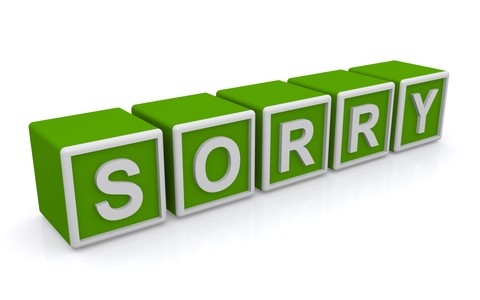SHOULD YOU NEVER SAY YOU’RE SORRY?
If we can agree that people are innately not perfect creatures, then we can also agree that leaders will make mistakes at certain points in their career. Some will be small, some will big, and some mistakes will be downright disastrous.
It seems common sense that people like apologies. But, how do we REALLY feel about an apology at work? Have YOU ever genuinely said, “I’m sorry” at work?
I was told to “never say you’re sorry” by a past superior.
It was a long time ago, but I know I was shocked by this statement. My mentor and leader (whom I looked up to), informed me that I shouldn’t take ownership of an error, and that it would take away from my credibility and hinder my success. This statement obviously struck a cord with me because I still remember this conversation all these years later.
Some believe that an apology doesn’t belong at work. I am not one of them.
A leader apologized to me – an act of strength
I had worked at a company for just over three months when it went into bankruptcy. Everyone was in shock, including my boss. But, he took it upon himself to apologize and express his regret that I left my last job just to lose this job. He was so sincere in his words…and the first thing that went through my head was what a great person he was. It wasn’t his fault that the company broke down, nor was it his fault that I left a job to work for this company. In this time of shock, he was thinking of those that worked for him. The apology was not an act of weakness, it was an act of strength and a demonstration of his great leadership.
An apology doesn’t make someone less of a person. An apology takes courage. And I have respect for someone that genuinely apologizes.
Look out for the fake apologies:
- Example: “I’m sorry if you feel I stole your graphic design work”.
- It should be, “I’m sorry I took your work as my own”.
The second example is more authentic – the apologizer is taking responsibility for his/her actions rather than placing the blame on the other person.
The repeat offender:
- Example: The person gives what appears to be a genuine apology, “I’m sorry I took your work as my own”.
- But then the error is repeated over and over again.
- How can the first apology be real, if the behaviour wasn’t corrected?
When people repeat their mistakes, even if they apologize each time, they lose trust and credibility.
What the research says about executives that apologize:
Researchers from the Stanford Graduate School of Business (2004) concluded that if executives took full responsibility for a bad fiscal year, the public would still invest money in  their company stock. They surmised that if an executive makes a genuine apology, and takes responsibility, then the executive and/or company has the ability to control the situation, and change it. Ideally the error will be avoided in the future, and ultimately this means a turn-a-round in trust.
their company stock. They surmised that if an executive makes a genuine apology, and takes responsibility, then the executive and/or company has the ability to control the situation, and change it. Ideally the error will be avoided in the future, and ultimately this means a turn-a-round in trust.
In our Blueprint model for culture, Organizational Trust is one of the two core elements for success. The authenticity that is part of a real apology is a key part of building Organizational Trust.
Organizational Trust in action:
Maple Leaf Foods – 2008
In 2008 there was a widespread Listeriosis outbreak in Canada (caused by the bacterium Listeria), which was linked to cold cuts from a Maple Leaf Foods plant. There were 57  confirmed cases, and 22 people died.
confirmed cases, and 22 people died.
The company issued a voluntary recall before the outbreak was linked to their plant, and Michael McCain (President and CEO of Maple Leaf Foods), quickly issued a seemingly sincere and heartfelt apology. He stated, “Tragically, our products have been linked to illness and loss of life. To those people who are ill, and to the families who have lost loved ones, I offer my deepest and sincerest sympathies. Words cannot begin to express our sadness for their pain.”
McCain’s apology was authentic. He took responsibility for what happened, and showed genuine sympathy and emotion. This sort of vulnerability is difficult for leaders, but is a huge factor in building strong trust.
Maple Leafs Foods sales initially shrank by 50%, but 2 months after the apology sales were later reported to be down only 15%. McCain felt that the company’s transparency in dealing with the crisis helped win back customers.
Relating to the Stanford research, Maple Leaf Foods won back their customers’ trust because they came clean early with their errors, they showed their track record, and vowed to ensure public safety.
What was my inspiration for this post?
To be clear, this post is NOT about politics, and I am not taking any side in what Calandra was apologizing for.
However, when I saw and heard his apology, my first thought was, “why is he not able to control his emotions?”. But, then my second thought was, why should I look down upon a release of emotion during an apology when I believe that a genuine apology should exist between colleagues? This is what lead me to investigate my experience and feelings surrounding apologies in the workplace. Politics aside, how do you feel about his emotional response?
Some general public comments include:
- “What a limp wimp!”
- “He made it pretty clear that despite the apology he was going to go right back to doing the same thing. So his slightly incoherent, very contradictory ‘tearful apology’ leaves me a little unmoved.”
- “I do not know the man but I will give him the benefit of the doubt. He made a bad mistake and after thinking it over realized that he had done so and asked for forgiveness. I hope he is sincere and I hope others who act up in parliament will be brave enough to own up to their own mistakes.”
What comments would you add? When do you think it’s appropriate to apologize or not?
Scroll down, and let us know what you think!
If you like this blog, check out these posts!
- Effective Communication – tone, body language, and brevity
- To forgive or not to forgive – when TRUST is broken at work
- 10 Rules for how to be a good leader
You would love our Handbook! It helps organizations to build Trust and Agility! Click HERE to find out how to Re-Invent the Workplace!


